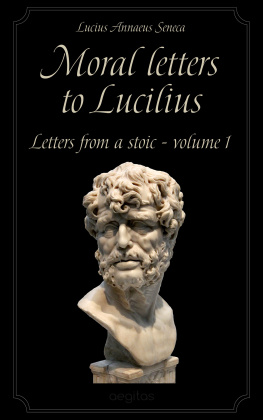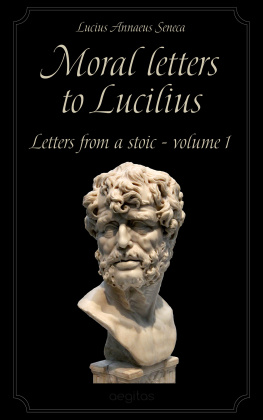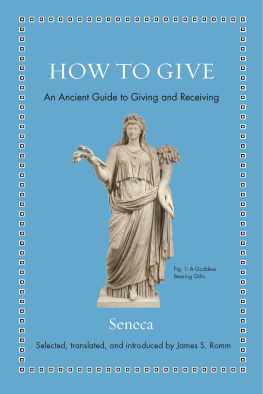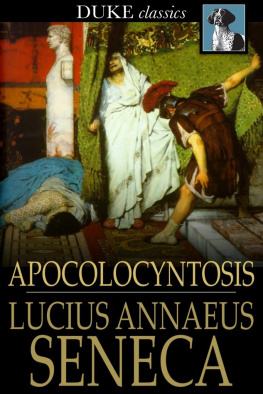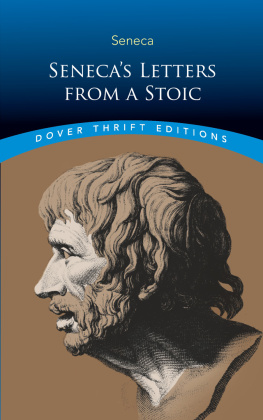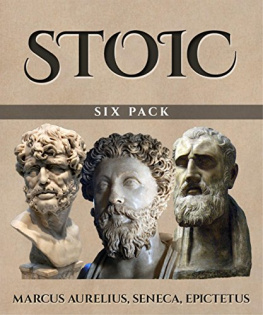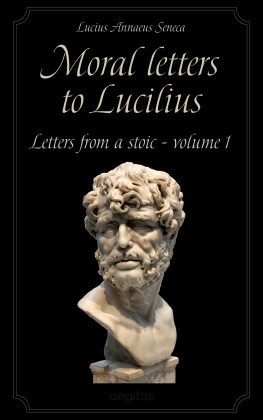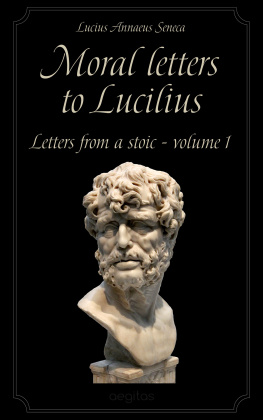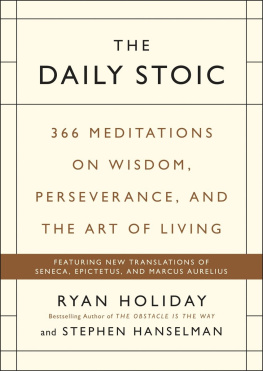Seneca - Letters from a Stoic
Here you can read online Seneca - Letters from a Stoic full text of the book (entire story) in english for free. Download pdf and epub, get meaning, cover and reviews about this ebook. year: 2004, publisher: Penguin Publishing, genre: Art. Description of the work, (preface) as well as reviews are available. Best literature library LitArk.com created for fans of good reading and offers a wide selection of genres:
Romance novel
Science fiction
Adventure
Detective
Science
History
Home and family
Prose
Art
Politics
Computer
Non-fiction
Religion
Business
Children
Humor
Choose a favorite category and find really read worthwhile books. Enjoy immersion in the world of imagination, feel the emotions of the characters or learn something new for yourself, make an fascinating discovery.
Letters from a Stoic: summary, description and annotation
We offer to read an annotation, description, summary or preface (depends on what the author of the book "Letters from a Stoic" wrote himself). If you haven't found the necessary information about the book — write in the comments, we will try to find it.
Seneca: author's other books
Who wrote Letters from a Stoic? Find out the surname, the name of the author of the book and a list of all author's works by series.
Letters from a Stoic — read online for free the complete book (whole text) full work
Below is the text of the book, divided by pages. System saving the place of the last page read, allows you to conveniently read the book "Letters from a Stoic" online for free, without having to search again every time where you left off. Put a bookmark, and you can go to the page where you finished reading at any time.
Font size:
Interval:
Bookmark:

LETTERS FROM A STOIC
ADVISORY EDITOR: BETTY RADICE
LUCIUS ANNAEUS SENECA, statesman, philosopher, advocate and man of letters, was born at Cordoba in Spain around 4 B.C. Despite his relatively undistinguished background and ever-recurrent ill health, he rose rapidly to prominence at Rome, pursuing the double career in the courts and political life for which he had been trained. He began also quickly to acquire celebrity as an author of tragedies and of polished essays, moral, literary and scientific. Sentenced to death by successive emperors (Caligula in A.D. 37 and Claudius in A.D. 41), he spent eight years in exile on the island of Corsica, allegedly for an affair with Caligulas sister. Recalled in A.D. 49, he was made praetor, and was appointed tutor to the boy who was to become, in A.D. 54, the emperor Nero. On Neros succession Seneca acted for some eight years as an unofficial chief minister. The early part of this reign was remembered as a period of sound imperial government, for which, according to our sources, the main credit must be given to Seneca. His control over an increasingly cruel emperor declined as enemies turned Nero against him with representations that his popularity made him a danger, or with accusations of immorality or excessive wealth ill assorting with the noble Stoic principles he professed. Retiring from public life he devoted his last three years to philosophy and writing, particularly the Letters from a Stoic. In A.D. 65, following the discovery of a plot against the emperor, which might have resulted in Senecas elevation to the throne, he and many others were compelled by Nero to commit suicide. His fame as an essayist and dramatist lasted until two or three centuries ago when, unaccountably, he passed into literary oblivion.
ROBIN CAMPBELL lives in Islington, London. An exiled Scot, now a barrister, he decided that Seneca was overdue for discovery while at Wadham College, Oxford, where he was an Open Classical Scholar and gained a First in Honour Mods. He served in Kenya and Uganda with African troops as a subaltern in a Highland Regiment, and after a year at Cambridge learning another African language (Chinyanja), he returned to Africa for three years as a District Officer. This was followed after Zambias independence by a year as a Magistrate, trying witch-doctors, hearing appeals from tribal courts over a vast area and revising this translation at intervals of leisure in the bush. His practice at the bar in Grays Inn tends to be concerned with action by local authorities. He holds strong views on the importance and difficulties of good translation.
SENECA
Epistulae Morales ad Lucilium
SELECTED AND
TRANSLATED WITH AN
INTRODUCTION
BY ROBIN CAMPBELL
PENGUIN BOOKS
PENGUIN BOOKS
Published by the Penguin Group
Penguin Books Ltd, 80 Strand, London WC2R 0RL, England
Penguin Putnam Inc., 375 Hudson Street, New York, New York 10014, USA
Penguin Books Australia Ltd, 250 Camberwell Road, Camberwell, Victoria 3124, Australia
Penguin Books Canada Ltd, 10 Alcorn Avenue, Toronto, Ontario, Canada M4V 3B2
Penguin Books India (P) Ltd, 11 Community Centre, Panchsheel Park, New Delhi 110 017, India
Penguin Books (NZ) Ltd, Cnr Rosedale and Airborne Roads, Albany, Auckland, New Zealand
Penguin Books (South Africa)(Pty) Ltd, 24 Sturdee Avenue, Rosebank 2196, South Africa
Penguin Books Ltd, Registered Offices: 80 Strand, London WC2R 0RL, England
www.penguin.com
First published 1969
25
Copyright Robin Alexander Campbell, 1969
All rights reserved
Except in the United States of America, this book is sold subject to the condition that it shall not, by way of trade or otherwise, be lent, re-sold, hired out, or otherwise circulated without the publishers prior consent in any form of binding or cover other than that in which it is published and without a similar condition including this condition being imposed on the subsequent purchaser
LUCIUS ANNAEUS SENECA was born at Cordoba, then the leading town in Roman Spain, at about the same time as Christ. but also of Novatus, later known as Gallio, the governor of Achaea who declined to exercise jurisdiction over St Paul (Acts XVIII, 1117), and of Mela, less ambitious than his brothers but an able financier (and father of the brilliant young poet Lucan).
Seneca suffered severely from ill health, particularly asthma, throughout his life; he tells us that at one time the only thing which held him back from committing suicide was the thought of his fathers inability to bear the loss. and developed a lasting interest in natural science, speculative rather than empirical (although Pliny speaks of him as an authority on geology, marine life and meteorology, and others have admired his remarks on, for example, evolution or the explanation of rings round the sun). His interest was drawn at an early age to Pythagorean mysticism and various cults of eastern origin then gaining adherents in Rome, before his final acceptance, in large part, of the Stoic philosophy.
After training for the bar he took successfully to public life, becoming quaestor in spite of the handicaps of his health, his foreign background and comparative lack of family or other connexions. When Caligula succeeded Tiberius in A.D. 37, Seneca had become a leading speaker in the Senate, and so aroused the jealousy This incident apparently resulted in his temporary retirement from political affairs.
In A.D. 41, in the first year of the reign of Caligulas successor, Claudius, Seneca again came under sentence of death commuted to banishment for reasons which we do not know. The pretext was adultery with Julia Livilla, the late emperors sister; the more likely explanation is that the new rulers consort, the notorious Messalina, considered him dangerous. His exile on the island of Corsica does not seem to have been endured as stoically as it might have been. The encouraging spirit of an essay of consolation sent to his dearly loved mother Helvia is entirely absent in another addressed to Polybius, an ex-slave who had become a trusted servant of the emperor, which contains some abject flattery and was probably never meant to be published. He had by now suffered the loss not only of his father but of a son, and his first wife died while he was away. The only solace for him in these eight long years of loneliness and near despair was the reception given to the poems, tragedies and essays to friends which he continued composing during his banishment.
His fortunes turned dramatically in A.D. 49. Messalina had been executed and the emperors new wife, Agrippina, had Seneca recalled to Rome, appointed to the high office of praetor and made tutor to her twelve-year-old son Lucius Domitius Ahenobarbus (the boy who was shortly to become the emperor Nero). Agrippinas motives, according to Tacitus, apart from the instruction of her son, were a confidence that because of his literary fame the move would gain them popularity, and a belief that he would prove a reliable ally and a useful adviser to herself and Nero in their plans for future power.
There is no evidence that Seneca was connected with the poisoning of Claudius in A.D. 54. But he wrote the speeches which the seventeen-year-old Nero delivered after his accession, and was probably the author of a witty, if to us a little tasteless, attack on the death rulers memory (the Apocolocyntosis or Pumpkinification, an imaginary tale of the rebuffs received by the recently deceased emperor when he presents himself at the portals of Heaven and his application for admission is debated by the Gods). Nero did make a formal speech in honour of his predecessor, which was said to display a great deal of polish and to be a good example of Senecas attractive style, well tuned to the ears of his time.
Next pageFont size:
Interval:
Bookmark:
Similar books «Letters from a Stoic»
Look at similar books to Letters from a Stoic. We have selected literature similar in name and meaning in the hope of providing readers with more options to find new, interesting, not yet read works.
Discussion, reviews of the book Letters from a Stoic and just readers' own opinions. Leave your comments, write what you think about the work, its meaning or the main characters. Specify what exactly you liked and what you didn't like, and why you think so.


